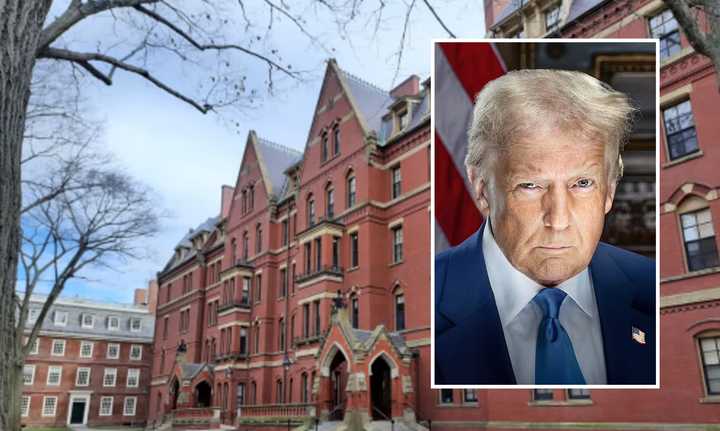Harvard's Tax-Exempt Status: President Condemns Revoking As 'Highly Illegal'

Table of Contents
Harvard's Justification for Tax-Exempt Status
Harvard University's tax-exempt status, granted under section 501(c)(3) of the Internal Revenue Code, hinges on its classification as a charitable organization dedicated to educational purposes and public benefit. This designation allows it to operate without paying federal income taxes. The university justifies its tax exemption based on several key contributions:
-
Extensive Contributions to Research and Scholarship: Harvard's faculty and students consistently produce groundbreaking research across diverse fields, contributing significantly to the advancement of knowledge and benefiting society as a whole. This includes advancements in medicine, technology, and the humanities. For instance, [cite specific example of Harvard research and its impact].
-
Commitment to Providing Financial Aid and Access to Education: Harvard's substantial financial aid program ensures that talented students from all socioeconomic backgrounds have access to a world-class education. [Include statistics on financial aid, percentage of students receiving aid, and the scale of the aid program]. This commitment directly combats inequality and promotes social mobility.
-
Role in Community Engagement and Public Service Initiatives: Harvard engages extensively with the surrounding community through various initiatives, offering resources, expertise, and support to local organizations and residents. [Provide specific examples of community engagement programs]. This commitment underscores its dedication to public service and societal betterment.
-
Compliance with IRS Regulations for 501(c)(3) Organizations: Harvard maintains meticulous records and adheres strictly to all IRS regulations for nonprofit organizations, ensuring transparency and accountability in its financial dealings. This includes regular audits and the timely submission of all required reports.
-
Details on Harvard's Financial Transparency and Reporting: Harvard publishes detailed annual financial reports, offering comprehensive insight into its revenue streams, expenses, and endowment management. This commitment to financial transparency demonstrates its accountability to the public and reinforces its eligibility for tax-exempt status.
Arguments Against Harvard's Tax-Exempt Status (and Rebuttals)
Despite Harvard's justification, criticism persists regarding its tax-exempt status. These criticisms often center on several key points:
-
Criticisms Focusing on Harvard's Substantial Endowment: The size of Harvard's endowment, totaling billions of dollars, has prompted questions about the fairness of its tax exemption. Critics argue that such substantial wealth should contribute to the tax base.
-
Arguments Suggesting a Lack of Affordability and Accessibility: While Harvard offers significant financial aid, the cost of attendance remains high, leading to arguments that the university is not sufficiently accessible to students from lower-income backgrounds.
-
Concerns about the University's Investments and Their Social Impact: Concerns have been raised regarding the ethical and social implications of Harvard's investment portfolio. Critics scrutinize investments in industries perceived as environmentally damaging or socially irresponsible.
Rebuttals:
-
Counterarguments Emphasizing Harvard's Financial Aid Programs: Harvard consistently emphasizes its substantial investment in financial aid, arguing that this commitment significantly broadens access to education regardless of financial background.
-
Discussion of Harvard's Efforts to Increase Access and Affordability: Harvard points to ongoing initiatives aimed at enhancing affordability and accessibility, including increased financial aid packages and programs to support students from underrepresented groups. [Cite specific initiatives and their goals].
The Legal Ramifications of Revoking Harvard's Tax-Exemption
Revoking Harvard's tax-exempt status would trigger significant legal challenges. The process is complex and involves a series of steps outlined by the IRS, including investigations and opportunities for appeals.
-
Potential Legal Challenges from Harvard: Harvard would undoubtedly mount a strong legal defense, arguing that the revocation violates its due process rights and contradicts established precedents regarding the tax exemption of educational institutions.
-
Precedents in Similar Cases Involving Nonprofit Tax Exemptions: Legal precedent plays a crucial role in determining the outcome of any challenge. Past court rulings on similar cases involving the revocation of nonprofit tax exemptions will heavily influence the legal arguments and potential outcomes.
-
The Process and Standards for Revoking a Tax-Exempt Status: The IRS has specific procedures and standards for revoking a tax-exempt status. These procedures are designed to ensure fairness and due process for the affected organization.
-
Discussion of Potential Constitutional Implications: The potential revocation raises constitutional questions regarding the government's power to regulate nonprofit institutions and the protection of educational freedom.
The President's Statement and its Implications
President [President's Name]'s statement condemning the potential revocation of Harvard's tax-exempt status as "highly illegal" carries significant weight.
-
Direct quotes from the President's statement: [Insert direct quotes from the President's statement emphasizing the illegality of the action].
-
Analysis of the President's Reasoning and Justification: The President's statement likely reflects a concern for legal precedent, the potential disruption to higher education, and the broader implications for nonprofit organizations.
-
Potential Political Impact of the President's Stance: The President's strong stance is likely to influence the political landscape surrounding the debate, potentially affecting the likelihood of any legislative action aimed at revoking Harvard's tax-exempt status.
-
Impact on Public Perception of Harvard and Higher Education: The President's statement may impact public perception of both Harvard and the broader higher education sector.
Conclusion
The debate surrounding Harvard's tax-exempt status is multifaceted, encompassing legal, ethical, and political considerations. Arguments for maintaining the status emphasize Harvard's contributions to research, scholarship, and community engagement. Conversely, criticisms highlight the university's substantial endowment and concerns about affordability and accessibility. President [President's Name]'s strong condemnation underscores the significant legal ramifications of revoking the exemption. Further discussion and analysis are needed to navigate this complex issue and understand the future of tax exemptions for higher education institutions. Understanding the implications of this issue is crucial for all stakeholders – stay informed about the ongoing developments regarding Harvard’s tax-exempt status and the broader implications for higher education.

Featured Posts
-
 Paulistao Corinthians Ou Santos As Apostas Revelam O Favorito
May 04, 2025
Paulistao Corinthians Ou Santos As Apostas Revelam O Favorito
May 04, 2025 -
 Google Search Ai Continued Training And Web Content Opt Outs
May 04, 2025
Google Search Ai Continued Training And Web Content Opt Outs
May 04, 2025 -
 Emma Stones Popcorn Dress A Showstopper At The Snl 50th Anniversary
May 04, 2025
Emma Stones Popcorn Dress A Showstopper At The Snl 50th Anniversary
May 04, 2025 -
 Martin Bakole Upset Victory Predicted Against Joseph Parker
May 04, 2025
Martin Bakole Upset Victory Predicted Against Joseph Parker
May 04, 2025 -
 Two Days Of Crypto Chaos A Party Retrospective
May 04, 2025
Two Days Of Crypto Chaos A Party Retrospective
May 04, 2025
